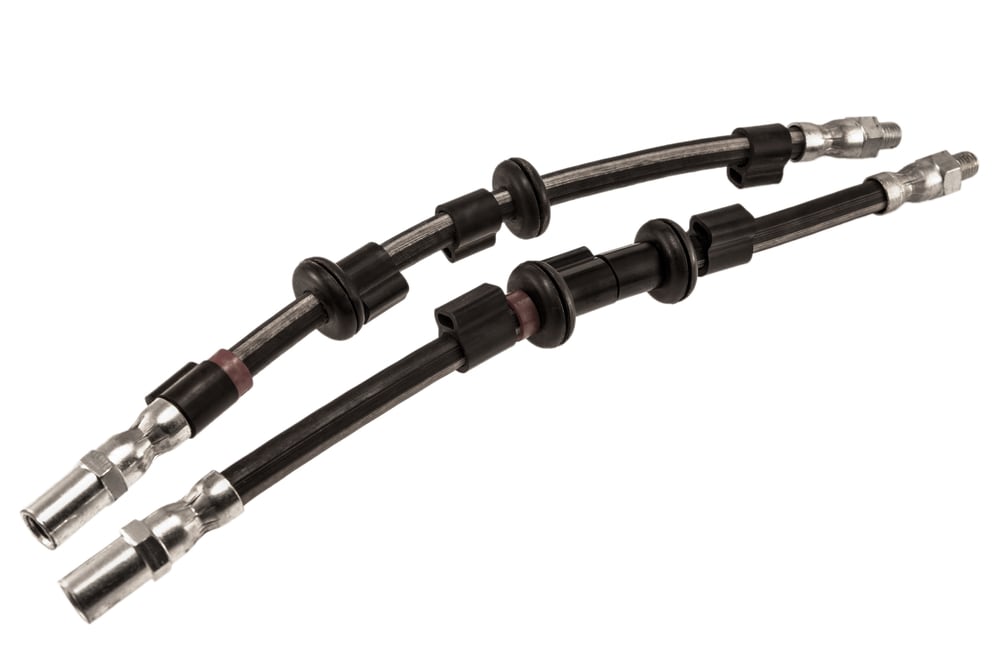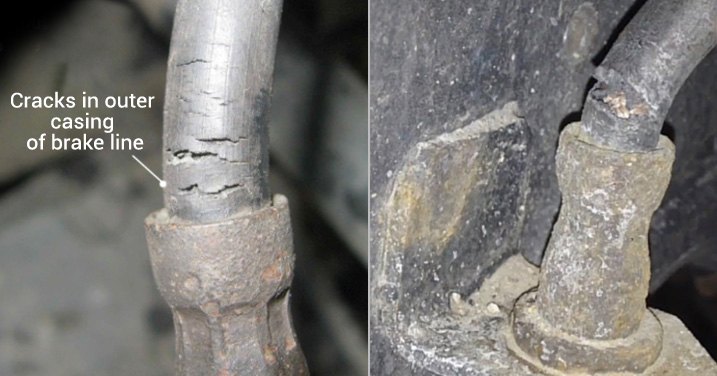Brake lines can break due to corrosion, external damage, or high pressure from the braking system. Brake line failure can be a dangerous situation that compromises the safety of your vehicle.
Corrosion is a common cause for brake line breaks, especially in areas with high humidity or where salt is used on the roads during winter. The constant exposure to moisture and salt can cause the brake lines to rust and weaken over time.
External damage, such as accidental bumps or scrapes, can also lead to brake line failure. Additionally, excessive pressure from the braking system can put stress on the lines, causing them to rupture.
Regular inspections and maintenance of your brake system can help prevent these issues and ensure the smooth and safe operation of your vehicle.

Credit: www.yourmechanic.com
Can I Drive With A Broken Brake Line
Your car’s brake line can break due to factors like corrosion, wear and tear, or accidents. It’s crucial to address this issue immediately as driving with a broken brake line can be extremely dangerous, compromising your ability to stop your vehicle effectively, so it’s advisable to get it repaired before driving.
Can I Drive With A Broken Brake Line?
If you suspect that your brake line may be broken, you’re probably wondering if it’s safe to continue driving your vehicle. Well, the short answer is no. Driving with a broken brake line can be extremely dangerous and is not recommended.
Here’s why:
The Risks Of Driving With A Broken Brake Line:
- Loss of Braking Power: A broken brake line means that the hydraulic fluid needed to transmit force from the brake pedal to the brake calipers is leaking. This can result in a significant loss of braking power, making it difficult to stop or slow down your vehicle.
- Increased Stopping Distance: With a faulty brake line, your vehicle’s stopping distances can increase significantly. This means that your car will take longer to come to a complete stop, potentially leading to accidents and collisions.
- Inability to Brake: In severe cases, a completely broken brake line can result in a total loss of braking ability. This means that no matter how hard you press the brake pedal, your brakes won’t engage, and you won’t be able to stop your vehicle.
- Brake Fluid Loss: A broken brake line causes brake fluid to leak out, resulting in a decreased level of fluid in your braking system. It’s important to note that brake fluid plays a crucial role in your vehicle’s braking mechanism, and the loss of this fluid can lead to further brake system failures.
- The Risk of Accidents: Driving without proper braking capabilities significantly increases the risk of accidents. Not being able to stop or slow down your vehicle when needed can put you, your passengers, and other road users in dangerous situations.
What To Do If You Have A Broken Brake Line:
If you suspect a broken brake line, it is crucial to take immediate action to address the issue. Here’s what you should do:
- Stop Driving: Do not continue driving your vehicle if you suspect a brake line failure. It’s important to prioritize your safety and the safety of others on the road.
- Seek Professional Help: Contact a qualified mechanic or automotive technician who can diagnose and repair the broken brake line. Attempting to fix the issue yourself without the necessary knowledge and expertise can lead to further damage or improper repairs.
- Tow Your Vehicle: If your brake line is confirmed to be broken, arrange for your vehicle to be towed to the repair facility. Driving your vehicle without functioning brakes is extremely risky and can have severe consequences.
Remember, it’s always better to be safe than sorry when it comes to brake system issues. Don’t take the risk of driving with a broken brake line – prioritize your safety and get it fixed immediately.

Credit: www.carid.com
Conclusion
Understanding the potential causes of brake line breaks is crucial for maintaining vehicle safety. Proper maintenance and regular inspections are essential for preventing brake line failures. Avoiding excessive pressure, corrosion, and physical damage can help extend the lifespan of your brake system.
Stay informed and proactive to ensure the reliability of your vehicle’s brakes.
